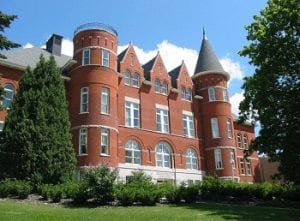New community solar energy project launched in Washington
December 5, 2014University helps launch a new solar power project
Washington State University has launched a new community solar energy project. Community projects allow several consumers to share the benefits of a single renewable energy system. These projects pools investments from a community rather than relying on the financial aid provided by a government agency or private investment firms. The projects are particular popular among people interested in clean energy but do not own a home of their own. In the past, solar energy systems were typically reserved for homeowners because they had the ability to install solar panels on their properties.
Community solar project will help expand the availability of clean energy to more consumers
The community project is being managed by Inland Power and Light Co., a company based in Spokane, Washington. The project is receiving support from Washington State University as well as those within the community the project is meant to serve. Some 112 solar panels will be used for the project, which will generate electrical power to approximately 1,200 people. The project itself cost approximately $150,000 to develop and those receiving energy through the community project will receive credit toward their energy bills every month through 2034.
Community projects help those without homes of their own take advantage of solar power
 Many homeowners have been able to make use of solar energy for some time now. There are several companies that provide solar power systems to those that own property, but not everyone owns a home. Community projects can make solar power more inclusive, allowing a wider range of consumers to take advantage of clean energy and its financial benefits. The Department of Energy has begun encouraging the formation of community solar projects to ensure that the solar market continues to expand.
Many homeowners have been able to make use of solar energy for some time now. There are several companies that provide solar power systems to those that own property, but not everyone owns a home. Community projects can make solar power more inclusive, allowing a wider range of consumers to take advantage of clean energy and its financial benefits. The Department of Energy has begun encouraging the formation of community solar projects to ensure that the solar market continues to expand.
Community projects may soon become more common
In the United States, many solar projects are supported by federal tax incentives. Many of these incentives are set to expire by 2020, which means that the financial aid the federal government is will no longer be available. As tax incentives begin to expire, community solar projects may become more common.

 HFN News is your leading source for fresh hydrogen and renewable energy updates. Amid the fast-paced growth of hydrogen companies, we provide top-notch news and insights about this exciting sector. Our coverage spans from hydrogen cars to global sustainable initiatives, and we highlight the latest in green jobs and developing hydrogen hubs. We invite you to share your local hydrogen news and explore today’s renewable energy job listings on our site. Thanks for choosing HFN News as your trusted guide to the hydrogen and renewable energy world!
HFN News is your leading source for fresh hydrogen and renewable energy updates. Amid the fast-paced growth of hydrogen companies, we provide top-notch news and insights about this exciting sector. Our coverage spans from hydrogen cars to global sustainable initiatives, and we highlight the latest in green jobs and developing hydrogen hubs. We invite you to share your local hydrogen news and explore today’s renewable energy job listings on our site. Thanks for choosing HFN News as your trusted guide to the hydrogen and renewable energy world!